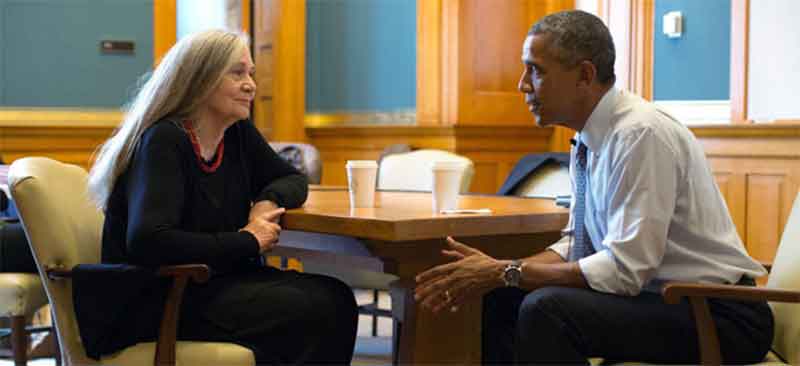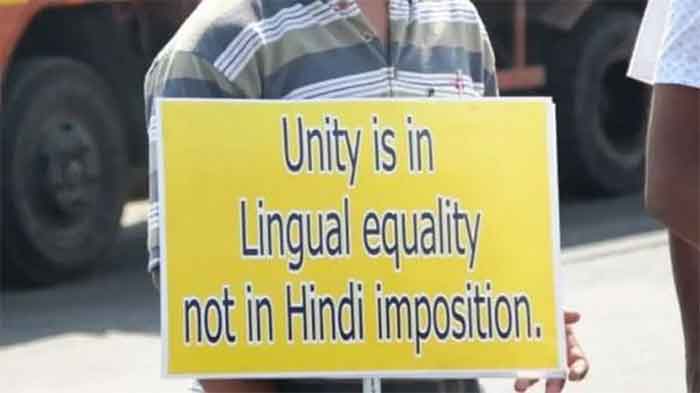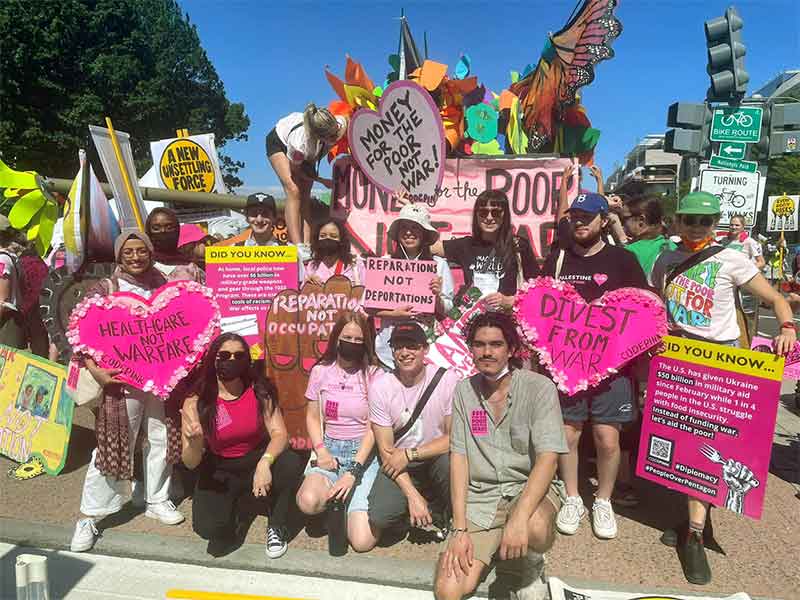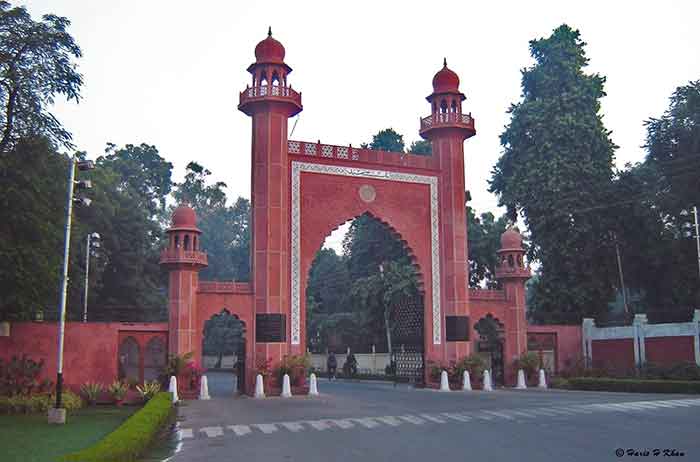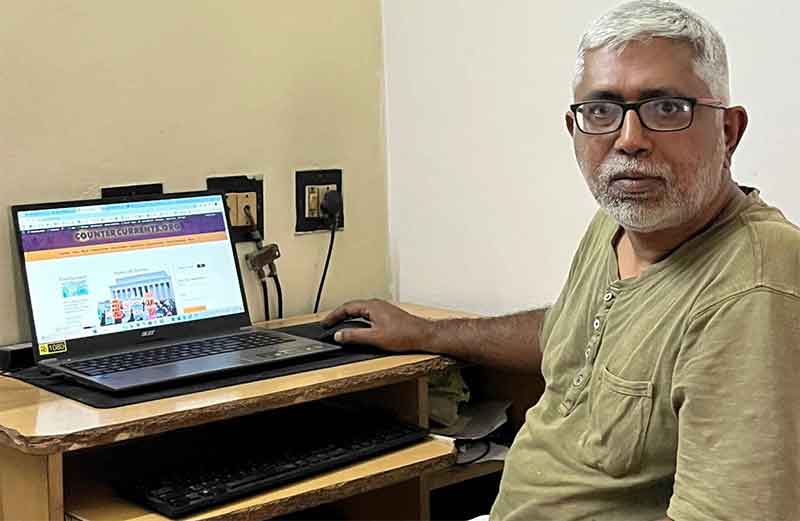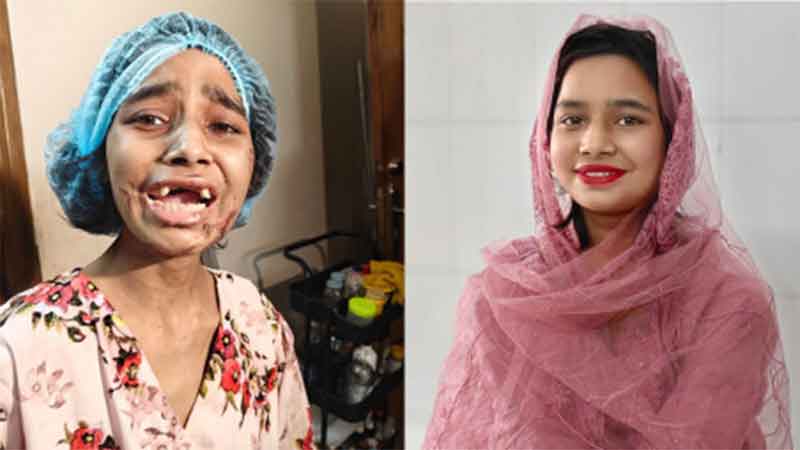
[Left] When Kalpana was rescued in October 2024. [Right] Kalpana is set to be released from the hospital in 2025. Photos: Collected
Very often, it is hard to go through a month without reading a horrid story of a domestic worker victim, who has had to endure unimaginable violence in the hands of an employer. Nowhere in the world other than Bangladesh does it occur so frequently. A 13-year-old Bangladeshi girl named Kalpana worked as a domestic help in the house of 21-year-old Dinat Jahan Ador for four years. On October 19, 2024, police raided her house in the middle of the night and she was arrested. Ador’s brother was also arrested because he had played a role in aiding his sister to carry out such horrible abuse on a defenseless little girl. After receiving tips from a journalist at a private TV channel, police rescued Kalpana in an affluent area in Dhaka from house number 466 on road no-3 at Bashundhara’s sector I. The charges against Ador were — causing Kalpana extensive injuries, burns, black and blue bruises, and knocking her four front teeth.
The arrested Dinat Jahan Ador used to study BBA in a private university, but has left studies. Her parents live in a separate house in Dhanmondi residential area.
The lawyers of Dhaka’s Women and Children Repression Act have taken over the case to defend Kalpana. They are making sure that the two accused tormentors are behind bars in the jail until their trial. That way both siblings will not be free to victimize another girl. Ador’s lawyers have attempted to secure bail for her and brother. But their bail was denied.
Lately, Estiak Emon (linked to Ekattor TV) shared a photo of a smiling Kalpana on Facebook, expressing his thoughts: “I may not have any major accomplishments in life, but I always strive to help others as much as possible. To me, being able to help is an achievement in itself because I strongly believe in the power of prayers. Many of you may recall Kalpana’s tragic ordeal. After 100 days of treatment, she has now recovered and is returning home. I hope this marks the beginning of a new, hopeful chapter in her life. I am incredibly grateful to everyone who supported her throughout this difficult journey.”
Kalpana is the daughter of Shahid Mia and Afia Begum of Sujan village in Lakhai Upazila, Habiganj, in the Sylhet district (northeastern region of Bangladesh). 24% people in Sylhet live in poverty in the slums. Children in the urban slums are the most disadvantaged and vulnerable group suffering from malnourishment and other related health problems. Hence they are sent to work as domestic workers in other big cities in search for a better life.
Kalpana is the fifth among five sisters and one brother. She was in Dhaka Medical College Hospital’s Burn and Plastic Surgery Unit undergoing treatment where kind doctors saw to it that she gets the best care. The hospital was home for three months where she underwent six surgeries to get her fixed from her injuries that she had sustained in the hands of her employer.
Before her release from the hospital, Kalpana got four false teeth to fill the gap where her natural teeth used to be. The after picture shows she is smiling and in good health from the tender care she had received there. But beyond that smile the scars will remain for the rest of her life. I am not a psychologist – but common sense tells me that such trauma and torture never leaves a person.
Children are resilient – but experts believe that in the long run this type of gruesome torture changes a person. Such inhumane treatment is extremely humiliating and breaks the spirit. Kalpana will have a hard time trusting people, and she will probably be afraid when around people. Besides, until her false teeth are replaced with implants – she will have to take these out every night before sleep, and it will be a reminder of the abuse that she had suffered.
I had read that the hospital authorities are working on getting her permanent implants. Kalpana now has gone back to her village with her parents to start a different type of life. Kalpana’s mother has assured everyone who had gathered at the hospital before their journey home that she will not send her daughter back to anyone’s house to work as a domestic help. Instead she asked for financial support from the good Samaritans for Kalpana to go to school. Kalpana is all excited about the prospect and wants to be a doctor in the future.
In Dhaka and other big cities’ affluent residential areas where prosperous people live — often lies an ugly truth that in some of these beautiful houses hide very dark and ugly secrets about what happens behind the closed doors. In such picturesque tree lined houses often young girls are chosen to work as domestic workers to help with the household chores. Being unable to care for their preteen and teenage daughters, the poor parents send them to the homes of affluent people to work. As it turns out these girls are usually underage whose parents in nearby villages and other far away villages send them to the cities to work for the well-to-do families. In exchange for the so-called “better life” girls like Kalpana are offered minimal pay, food, and hand me down clothing that their employer’s teenage daughters have discarded.
Kalpana came from a faraway district in seeking a more fulfilling life. Of course, it was not her choice – her parents made her come. In a lot of houses the domestic helps are not given freshly made food – they eat after everyone, and often are asked to eat leftovers from the night before that was left outside. The stale food is not edible as it goes bad for lack of refrigeration, and yet, they are forced to eat it. Why would these girls accept such treatment? Why else? Poverty is the primary cause.
From the moment these domestic workers walk into the homes of their employers — many are faced with overwhelming workloads. They are not trained to perform heavy amounts of domestic work – 14 to 18 hours a day, with very few rights and freedom to enjoy. They are required to care for young children, while cooking, cleaning, washing clothes, and running endless errands for their employers.
Other than poverty, many other factors such as abandonment, family break-up, and physical abuse are also common catalysts for the young girls to leave home to become domestic workers. More often than not, these girls follow their mothers, elder sisters, cousins and neighbors as they serve as a vehicle for them to enter the world of domestic work.
All the horrific stories of domestic help abuse sometimes garner massive media coverage if the accused is a civil society person. In between, there are hundreds more who had faced similar fate, and thousands more will continue to suffer as I write. A lot of these victims bear torture marks on their thighs, backs, and hands. These are usually made with a hot iron kitchen spatula that the employer loves to use if they find the slightest mistake a house help makes.
A domestic worker such as Kalpana and alike endure horrific treatment simply because such ghastly treatment goes unchecked. These girls are robbed of their childhood as they are made to work long hours every day – such ill-fated girls are considered invisible people. They often are pushed to a breaking point with overwork.
Not only that, they are regularly abused, beaten, and oftentimes sexually abused by a member of a household or by a visiting relative. In a lot of the households, a domestic worker cannot leave the house — nor are they allowed to contact their families in the villages. The perpetrators (usually the mistress of the house) know they are committing punishable offences by inflicting pain on a house help. Therefore, they fear exposure will land them in jail – hence the captivity.
In quaint little areas with beautiful houses and modern apartment buildings in the big cities of Bangladesh – a lot of the occupants are anything but civil in their treatment of the young girls they hire to help with the household chores.
Who really are these monsters who torture their house helps as if they live in the Dark Ages? Or are they mythical creatures that look like a human? Well, they are a wide variety – they come in all shapes and sizes. They are our everyday mothers, sisters, decorated cricketer and wife, law enforcement officers, housewives, a newspaper’s executive editor and his wife. Let us look at two such fairly recent cases involving two members of Bangladesh Sushil Shomaj (civil society.) 1) A former executive editor named Syed Ashfaqul Haque of Bangladesh English daily The Daily Star and his wife Tania. 2) A former national cricket team pacer Shahdat Hossain and his wife Nritto.
According to Dhaka Tribune — In April of 2024, the Daily Star’s Syed Ashfaqul Haque and his wife Tania were taken into custody over the death of their domestic help — an indigenous teenage girl named Preeti Urang of the Chittagong Hill Tracts. Preeti had jumped from the 4th floor balcony to escape her employers and it was a fatal fall. Two months after the story broke (in February) Ashfaqul had continued to work for the Daily Star. Because of intense scrutiny from the public, the Daily Star published a statement saying it has sacked its executive editor without giving a reason. Prior to that the paper took a soft approach to this horrific incident and offered a very unacceptable reasoning for the delay. The Star kept on protecting this evil person in the disguise of a journalist. The paper had issued the following statement saying, “We express our deepest sorrow at the unfortunate occurrence and convey our deepest condolences to her bereaved family. We await the outcome of the investigation.”
Four months after Preeti’s death, a Dhaka Court had granted bail to Ashfaqul in a case filed by Preeti’s father over the death of his daughter.
Not only that – a similar occurrence had happened a year before (August of 2023) in Ashfaqul’s flat in Dhaka. Another domestic worker/housekeeper named Ferdausi jumped from the same balcony to get away from her employers. She did not die – but sustained serious bodily injuries. The media reports showed that charges were filed against Ashafaqul and his family members by the victim’s family. The case did not go to court as the victim’s family was silenced with a large amount of hush money.
How could a “reputable” newspaper allow Ashfaqul with such allegations to work there even after the first incident?
Bangladesh’s cricketer Shahadat Hossain and his wife Jasmine Jahan Nritto’s case — In September 2015, Shahadat and his wife Nritto had fled their Dhaka home after their domestic help 11-year-old Happy was found with extensive injuries. After physically torturing Happy, the cricketer and Nritto had left her on a street in Dhaka. She was found by the police with multiple dislocated body parts, and swollen eyes.
A month later Nritto was arrested from her hideout and Shahadat surrendered to the court of the Dhaka Metropolitan Magistrate on the same day. On December, a Dhaka court gave Nritto an interim bail until January and Shahadat also got 3-month bail from the High Court. However, such gross VIP treatments to the alleged criminals send a wrong message. They should have been in jail awaiting trial.
It is appalling that in November, 2016 both Shahadat and his wife Nritto were acquitted by a Dhaka court on charges of torturing Happy. Reason being the prosecutors failed to prove them as guilty. They were only in jail for two months. Later Shahadat was allowed to play domestic cricket. He has done nothing to correct his ‘mistake’ since he was granted bail. He did not even play a small part in Happy’s rehabilitation at the crisis center. Forgiving Shahadat showed that two kinds of justice systems exist. After this how can we have faith in the judicial process?
The court may have exonerated this couple but the public never forgave them for their sinister and criminal act for torturing Happy. By holding the cricketer accountable the justice system could have made an example out of him. Was the court system manipulated in letting Shahadat go free? Prior to the trial there were multiple reports that he had offered Happy’s family lots of money to withdraw the case.
Such people’s desire for special treatment and censorship is antithetical to the heart of a democratic society.
I do not know what happened to the Daily Star’s former executive editor Ashfaqul Haque case.
Not letting any abuser face the consequences can be seen as a flagrant manipulation of the law (which is poorly enforced as it is) in the name of elite entitlement. Some pervert the argument, diffusing the situation into a quibble between the haves and have-nots, distracting public focus from the serious, inhuman cruelties committed by women employers like Shanta and Nodi by abusing their household helpers.
In writing off and on for BD newspapers including the Daily Star for a number of years — I have noticed that when initial investigations of criminal allegations are conducted – subsequent inquiries or follow-ups are not done. Such a line of reporting only indicates a “failure” to properly follow-up an ongoing case in the investigative process. This is rather sad when journalism fails to do its due diligence in completing the process after the initial probe. In the end we do not know whether the reporters have followed all the additional leads which had raised concerns from the public. After a while they really do not care about public scrutiny. The newspapers simply move onto the next story.
For intensely inhuman, cruel or degrading treatment towards domestic workers — very little has been done from the state level to prevent it or to bring the offenders to justice. Yes, there is sensational media coverage when celebrities are involved in abusing their household help. In the past, the government has vowed that the accused wrongdoers will face justice as no one is “above the law.” Then such cases perhaps are settled out of court, drag for years, and ultimately become cold cases. Young girls like Kalpana, Preeti, and Happy become yesterday’s news and forgotten.
In developing countries like Bangladesh, using young girls as domestic workers is not a new phenomenon – it has continued for generations and remains a common practice. As I have stated earlier poverty is the key driving factor as to why underage girls become domestic helps. The uneducated and underfed young girls are sent by their parents to a supposedly “safe” environment to work as domestic workers.
Most likely, some of these inhuman practices are never going to change. During the previous government the decision to limit the minimum age of domestic workers to 14 has not done much to protect these vulnerable workers. The official line is – the domestic work will be recognized as a profession and under Labor Act when law etc.
But what good is a law if it is not implemented in the strictest sense? In Bangladesh, over 400,000 women and teenage girls work as domestic help. Only viable solution to the torture would be for the women/men in families to get off their freaking lazy bottom, and doing the household work by themselves. Are we not maintaining a house in the US, and all the everyday domestic chores without any hired “help”? I personally find this practice allows me to experience a sense of peace and clarity of mind. That would be one solution to the problem of underage domestic workers who are unfortunate victims of poverty. Then again other than working at other peoples’ houses they do not have any other marketable skills to generate an income. A lot of the poor families depend on the income that their daughters earn in order to survive.
In Bangladesh or elsewhere if you have to employ someone to lessen your loads then you must hire someone with a decent pay – you should give that person human dignity by not hurting her. Treat her as a member of your family. A domestic worker is not your “slave.” They should not be punished with extra work if they cannot perform the way you want them to.
Ten years ago, I wrote about one such victim named Aduri. Aduri was severely beaten and tortured and was left in a city dustbin for dead until police recovered her battered and bruised body. I still recall what she had said at a press conference in Dhaka. “Nodi madam cut my throat with a blade. She signed my skin with a hot iron. You people please bring her to justice. Nodi used to give me rotten rice to eat. She also put fire in my mouth and burnt my tongue. I hope no other girl has to go through this.” The photo of a skeletal Aduri on a bed in Dhaka Medical College Hospital haunted me for days.
It may have been Kalpana, Preeti, Ratna, Aduri and Happy’s fate to be born into a poor family where their parents could not feed them properly. Ratna’s father was near blind and the mother alone couldn’t provide for the family. She had no choice but to send the daughter away by trusting the household of a law officer without having any idea what fate had in store for her daughter.
What I had found unforgiveable when the Ratna case broke in 2015, how the Shushil Shomaj reacted to the story coverage. Some were outraged and objected to the media reports on the ground of a convoluted conspiracy theory of class resentment from the domestic workers. In short, it was implied that domestic helps often exaggerate their plight because of a latent hatred for their employers. Such a claim is absurd and very transparent to an objective viewer.
The cases of Kalpana, Preeti, Ratna, Aduri and Happy are not an over amplification. The pictures that were printed with torture marks – these were proof enough. As the old saying goes, “A picture is worth a thousand words.”
In many cases, the domestic workers are employed under false pretences, convinced by employers that their life will be better from the one they had before. The unthinkable pain and suffering of an empty stomach compel them to come out and take employment in others’ homes. Thousands of Kalpanas, Ratnas, Aduris and Happys endure punishment at the hands of brutes like Ador, Shanta, Nodi, and Nritto disguised behind the mask and beautiful outfits of a “bhadramahila.”
Twenty years ago, society turned a blind eye to the abuse of household workers – maids, cooks, farmhands, ayas and part-time buas; no one protested. One said and did to them as they pleased. Not much has changed — even today, they are often scolded and beaten for the slightest infraction – some imagined some real.
I often wonder when I read about domestic help abuse cases – how a person lives with herself/himself after causing such pain on another defenseless child? What are the reasons behind such monstrosities? The live-in situations of many underage domestic workers make them very dependent on their employers for their every need. Such dependencies make them susceptible to routine physical and psychological abuse and exploitation.
My own analysis would be: A lot of women, who become housewives, end up abusing their domestic help because they feel like prisoners themselves in gilded cages and often torment other less fortunate prisoners in their control. By that line of reasoning, then, in today’s society, educated career women would not carry on such atrocious acts behind closed doors, as they would be “liberated” and “enlightened”. They wouldn’t need to inflict their own anguish on others.
Yet, today, women still continue such mind-boggling and horrendous abuses because they enjoy the protection that comes with being from a certain class. They suffer no actual retribution, above a mild censor by the media (if found out). As a result, they frequently resort to more and more violent methods.
Are we not all children of this universe? If so, then no one should decide that a certain class should go unpunished.
Some of the Middle Eastern countries have been abusing the female migrant workers who come from the Philippines, Bangladesh, Nepal, and lndia as there are limited opportunities in their home countries to support their families. They come in search of a better life with a decent pay.
Abusers abuse because they lack conscience and for the most part they get away with it. If society took a stronger stance then such cases would be few and far between. Ultimately, it falls on the conscientious citizens to keep the vigil alive.
In a civilized society when such stories of abuse get out, the culprits first should be arrested and if found guilty – should be punished to the fullest extent of the law. Social status and position should not exempt those with privileges from being punished after causing inconceivable pain on other human beings.
I hope this article will in a very minimal way bring some vindication to Kalpana, Preeti, Ratna, Aduri, Happy, and thousands more underage domestic workers who, astoundingly, have no voice to protest. There is a huge demand for young domestic workers as they can be hired with very nominal pay and are too young to stand up for their rights.
We will have to wait and see what kind of changes the new government policy will bring in protecting the rights of the young domestic workers, so that they are not abused and thrown into the dumpster like garbage. Until that happens — We must write about the underage domestic workers without stripping them of human dignity, and rendering them into a grotesque circus show to entertain people over their morning tea and biscuit.
The trauma on Kalpana was the result of intentional violence – without a doubt has psychologically affected her very deeply. Outwardly, she seemed content and excited while she talked on camera. Wearing a new salwar/kameez and draping her head with sheer pink fabric dupatta — she seemed to be in a good place for the interview before she had left the hospital. Both her parents were there. At the hospital, she was looked after by the doctors and nurses. She said she is looking forward to her future as she wants to go to school and study and not think about what has happened to her. She feels that she was given a second chance in life and wants to utilize it by studying hard. Kalpana’s dream is to become a doctor one day. For a 13-year-old she seemed wise beyond her years. Her level of maturity awed me.
On the other hand, understandably, Kalpana’s mother had a few choice words for Ador, and what she would like to do to her if she saw her. Sitting next to her, Kalpana’s father broke down thinking about what horrific abuse his little daughter had to endure to earn a living. He only blamed his ill-fate and his inability to provide for his daughter.
The brutal abuse and the psychological ordeal that Kalpana had to undergo must have left her damaged in more ways than she was able to verbalize.
I hope by some twist of fate Ador’s sinister and criminal act will not go unpunished for torturing Kalpana. 21-year-old Dinat Jahan Ador is currently in jail for treating Kalpana in such an inhumane way. She ought to know that she is locked up for inflicting pain on another human being. She must face her demons and atone for her sins.
We will have to wait and see what kind of changes the interim government will bring in protecting the rights of the young domestic workers. No one deserves to suffer what Kalpana had to. Her front teeth got knocked down by Ador. In this world zillion people are born poor and for that destiny no one has the right to hurt them physically and mentally. Why Ador and her brother had turned out to be such brutes is only anyone’s guess. Growing up – they may have been through trauma, or were victims of abuse. It is possible that the prevalent cultural norms have influenced them to abuse Kalpana. Now their fate lies in the hands of the judicial system – however flawed it might be.
My hope and prayer is that Ador and her brother will be judged according to their crime by looking at all the evidence. A privileged person should never think it is their inborn right to unleash their inner anger, and frustration on a helpless human being.
Zeenat Khan writes from Maryland, USA






